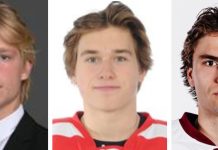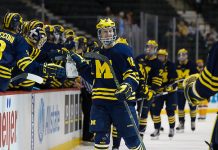Last year, none of the returning Hobey Baker finalists from the 2006-07 season were named finalists again in 2008. However, I had a feeling this year would be different, and as we prepare to enter the college hockey season’s second month, that feeling appears justified.
Not that it isn’t still possible for this season’s returning finalists to suffer injuries (as did Nathan Davis and Eric Ehn) or be outshone in the long run by a teammate (as Ryan Duncan was last season by T.J. Oshie and Jean-Phillippe Lamoureux), but Michigan State’s Jeff Lerg has started the season in fine form, and will enter November as a prime contender for college hockey’s highest individual honor.
Of course, whenever a goaltender enters the Hobey Baker discussion, the last goalie to win the award, Ryan Miller, isn’t far behind. Miller, as you’ll recall posted a mind-blowing .950 save percentage and 1.32 goals-against average when he won the award at Michigan State, and the popular theory in recent years has been that those numbers have set the bar for goaltenders so high that we may never see another netminder win the award.
You’d likely have little argument from the likes of David LeNeveu (2003), Yann Danis (2004), David McKee (2005), Brian Elliott (2006) or David Brown (2007), all of whom posted outstanding seasons en route to Hobey Hat Trick recognition, but none of whom was able to win the award.
That’s not to say that they were automatically disqualified for not matching Miller’s numbers. After all, David LeNeveu had to compete with Peter Sejna, whose 86 points en route to winning the Hobey would have been hard for even Miller to top, while Matt Carle’s season on the Denver blueline made him a not-altogether-difficult choice over Elliott. Still, Miller’s performance in the 2000-2001 season has haunted the goalies who’ve looked to follow in his footsteps as the next Hobey Baker winner in the net.
Lerg, however, may be different. The Spartan netminder has a wonderful story to go with his sparkling performance in the net. When one considers that Lerg does what he does in the Michigan State net while overcoming his small stature and his severe asthma, and while excelling in the classroom (Rick Comley touted Lerg’s 4.0 grade-point average during the 2007 NCAA Tournament run), it becomes clear that Lerg’s Hobey candidacy is about much more than his numbers.
This begs the question: if Lerg’s case for the Hobey about more than his numbers, do Miller’s numbers become less important? The fact that Lerg is a returning Hobey finalist in the first place suggests that the answer may be yes.
When Lerg was selected as a Hobey Baker finalist last season, he was not in the top 10 in the nation in either goals-against average or save percentage, and yet, he was included, while Colorado College netminder Richard Bachman, the WCHA Rookie of the Year and Player of the Year, was left out, among other worthy contenders. That suggests that Lerg’s overall story played a role in his selection as a finalist.
Of course, as large as Miller’s numbers loom, numbers are only part of the story, even before you factor in Lerg’s off-ice intangibles. When the Spartans won the NCAA title in 2007, Lerg hardly had Hobey numbers (although his numbers were certainly better than Robb Stauber’s before you adjust for the era), but he showed himself to be an outstanding big-game netminder, outdueling a pair of Hobey Finalists in Boston University’s John Curry and Notre Dame’s Brown to get to the Frozen Four, where he won against Maine’s Ben Bishop and Boston College’s Cory Schneider. That sort of performance is a good reminder of just how good Lerg is when he’s at his best.
Of course, at the moment, Lerg is doing quite well for himself in the numbers department, with a .947 save percentage and 1.58 GAA entering this weekend’s action, but it wasn’t much earlier in the 2007-08 season that we were still waiting for Lamoureux to allow his first goal at North Dakota. The grind of the season and the quality of competition in the CCHA may yet take its toll on Lerg. Even if they do, though, the question is how much Lerg’s intangibles, on and off the ice, will affect his candidacy.
I’m not suggesting that Lerg can have an ordinary season in net and win the award, mind you. I’m just wondering out loud if the statistical threshold for Lerg to win the Hobey is different than the statistical threshold for, say, Richard Bachman, or any of the goalies to be considered for the award since Miller won it.
I think it would be good to see another goalie win the award, and not just by bettering Miller’s numbers. Let’s face it: that’s a tall order for goalies, especially since no one is asking forwards contending for the award to match, say, Peter Sejna’s numbers. If Lerg’s inspiring story helps him break through – and possibly allow future Hobey Baker contenders to be judged on their own merits in net – more power to him.
Who knows? A Spartan set up this barrier, real or imagined. It may take a Spartan to break through it.


